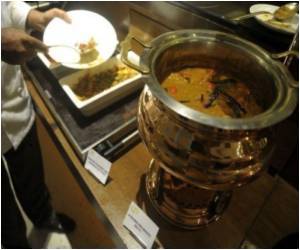The curry, spicy and steaming hot, eaten with naan bread and cold beer, has been popular as a takeaway or a late-night meal for the British.

Ever since officers of the British Empire brought home the spices and dishes of south Asia, Britons have embraced the curry -- a name used to describe a wide variety of food from the region -- while adapting it along the way.
This included inventing the chicken tikka masala, a lightly-spiced, creamy, tomato-based stew proclaimed as a "true British national dish" by then foreign secretary Robin Cook in 2001 and which now sells 49 million portions annually.
But the industry still relies on foreign cooks, largely from Bangladesh -- and it is warning that a cap on non-European Union immigration introduced on July 19 by Britain's new coalition government has put its future in jeopardy.
"Cooking curry is a special art," said Bajloor Rashid, president of the Bangladesh Caterers Association, which represents 12,000 Bangladeshi restaurants employing 100,000 people directly in Britain.
"You just cannot have anyone from here or there and becoming a chef -- they have to enjoy the cooking, they have to have the art of the cooking, otherwise it's not going to work."
"It's taken us a long time to build this industry so it's not easy just to put a cap on it and let it go," Rashid told AFP.
The owner of the Hindostanee Coffee, Dean Mahomed, was Indian, but these days 95 percent of restaurants are owned and managed by Bangladeshis.
One of these is Cafe Naz, a modern, spacious restaurant on Brick Lane, a street in London's East End which houses more than 100 curry houses and is buzzing with food lovers, day and night.
In the kitchen upstairs, 29-year-old tandoor chef Adeel Ashraf pulls a skewer of melt-in-the mouth marinated chicken out of a clay oven heated to a blistering 300 degrees Celsius (572 degrees Fahrenheit).
He has been in Britain for five years but cannot speak English, so his colleagues translate as he explains tandoor cooking, both of meat and the soft dough he sticks on the side of the oven to make naan flatbreads.
Fellow Bangladeshi cook Dewan Toughid, 38, who has also been here five years, says there is an art to the tandoor but one that many people cannot grasp. "English people are not working -- it's much too hot," he says.
He complains about a lack of cooks, a lament repeated by his boss, Cafe Naz owner Muquim Ahmed, who blames a first tightening of the immigration system under the previous Labour government.
"That's why my business is collapsing, because I can't get the right staff," said the 56-year-old Ahmed, who arrived in Britain from Bangladesh in 1974.
His son is studying computer science at university and has no interest in taking over. Nor do his peers, meaning restaurants must look to either locals or EU workers -- allowed to come here freely -- to replace retiring cooks.
But they argue that Britons or EU citizens cannot fill the gap without more training facilities, so they are forced to look to migrants.
Britain already has a professional culinary diploma, and following consultation with the business world, from September this will include units in Indian, Bangladeshi, Thai and Chinese cuisine.
Immigration Minister Damian Green said these would "train the chefs of the future" and said: "The government expects employers to make the most of them."
While the temporary cap on immigration was introduced on July 19, Green is still consulting on a permanent cap due to be implemented next April.
But he warned: "Employers should look to recruit from the UK before looking to recruit from the rest of the world.
"Our over-reliance on migrant labour has done nothing to help the millions of unemployed and low-skilled British citizens."
Source-AFP
 MEDINDIA
MEDINDIA


 Email
Email





